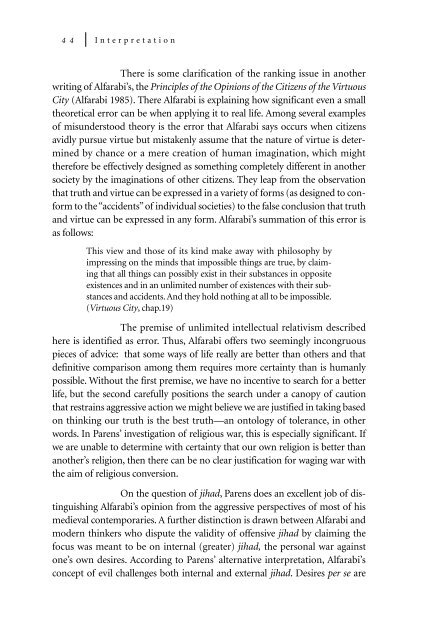Beyond Struggle and Power: Heidegger's Secret ... - Interpretation
Beyond Struggle and Power: Heidegger's Secret ... - Interpretation
Beyond Struggle and Power: Heidegger's Secret ... - Interpretation
You also want an ePaper? Increase the reach of your titles
YUMPU automatically turns print PDFs into web optimized ePapers that Google loves.
4 4 <strong>Interpretation</strong><br />
There is some clarification of the ranking issue in another<br />
writing of Alfarabi’s, the Principles of the Opinions of the Citizens of the Virtuous<br />
City (Alfarabi 1985). There Alfarabi is explaining how significant even a small<br />
theoretical error can be when applying it to real life. Among several examples<br />
of misunderstood theory is the error that Alfarabi says occurs when citizens<br />
avidly pursue virtue but mistakenly assume that the nature of virtue is determined<br />
by chance or a mere creation of human imagination, which might<br />
therefore be effectively designed as something completely different in another<br />
society by the imaginations of other citizens. They leap from the observation<br />
that truth <strong>and</strong> virtue can be expressed in a variety of forms (as designed to conform<br />
to the “accidents” of individual societies) to the false conclusion that truth<br />
<strong>and</strong> virtue can be expressed in any form. Alfarabi’s summation of this error is<br />
as follows:<br />
This view <strong>and</strong> those of its kind make away with philosophy by<br />
impressing on the minds that impossible things are true, by claiming<br />
that all things can possibly exist in their substances in opposite<br />
existences <strong>and</strong> in an unlimited number of existences with their substances<br />
<strong>and</strong> accidents. And they hold nothing at all to be impossible.<br />
(Virtuous City, chap.19)<br />
The premise of unlimited intellectual relativism described<br />
here is identified as error. Thus, Alfarabi offers two seemingly incongruous<br />
pieces of advice: that some ways of life really are better than others <strong>and</strong> that<br />
definitive comparison among them requires more certainty than is humanly<br />
possible. Without the first premise, we have no incentive to search for a better<br />
life, but the second carefully positions the search under a canopy of caution<br />
that restrains aggressive action we might believe we are justified in taking based<br />
on thinking our truth is the best truth—an ontology of tolerance, in other<br />
words. In Parens’ investigation of religious war, this is especially significant. If<br />
we are unable to determine with certainty that our own religion is better than<br />
another’s religion, then there can be no clear justification for waging war with<br />
the aim of religious conversion.<br />
On the question of jihad, Parens does an excellent job of distinguishing<br />
Alfarabi’s opinion from the aggressive perspectives of most of his<br />
medieval contemporaries. A further distinction is drawn between Alfarabi <strong>and</strong><br />
modern thinkers who dispute the validity of offensive jihad by claiming the<br />
focus was meant to be on internal (greater) jihad, the personal war against<br />
one’s own desires. According to Parens’ alternative interpretation, Alfarabi’s<br />
concept of evil challenges both internal <strong>and</strong> external jihad. Desires per se are
















